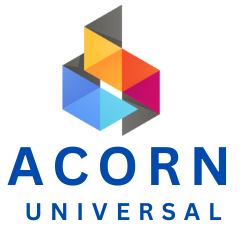- Info@acornuniversal.com
- Canada: 30 banks Dr. Brampton Ontario L6P 1A5
Blogs

How to Stay Ahead of Google Algorithm Updates
Maintaining and raising your website's search engine rating in the fast-paced world of digital marketing requires keeping up with Google's algorithm changes. To deliver the most relevant and excellent information to users, Google regularly modifies its algorithms. Updates like this can interfere with your website's SEO efforts even though they are meant to improve user experience. Acorn Universal provides some professional advice here on how to maintain your website's peak performance and keep ahead of Google algorithm changes.
Understanding Google Algorithm Updates
Google uses sophisticated algorithms to quickly provide the most relevant search results for a query by retrieving data from its search index. With several priority areas like content quality, mobile friendliness, user experience, and backlink quality, Google has released several significant improvements throughout the years.
Key Strategies to Stay Ahead
1. Stay Informed About Updates
Being knowledgeable is the first step to keeping ahead. Consistently monitor trade blogs, discussion boards, and news sources like Moz, Search Engine Land, and Google's Webmaster Central Blog. These resources give users up-to-date information on recently released and impending changes. You may modify your strategy proactively instead of reactively when you know what changes are on the horizon.
2. Focus on High-Quality Content
In the world of SEO, content still reigns supreme. The main objective of Google is to offer people relevant and useful material. Continually produce excellent, educational, and captivating material to remain ahead of algorithm changes. Make sure the interests and demands of your target audience are catered to in your material. To accommodate a variety of tastes, use a variety of formats, including articles, infographics, videos, and podcasts.
Tips for High-Quality Content:
-
Do in-depth research on keywords to find out what your target audience is looking for.
-
Compose thorough, in-depth pieces that address subjects from several perspectives.
-
Make sure your content is up-to-date and fresh.
-
Keep your concentration on using keywords naturally and relevantly; don't pack them in.
3. Optimize for Mobile
Google has moved to mobile-first indexing in response to the growing usage of mobile devices. This indicates that when indexing and ranking material, Google mostly looks at the mobile version. Use responsive design, optimize your photos, and speed up page loads on mobile devices to make sure your website is mobile-friendly.
Mobile Optimization Checklist:
-
Make use of a responsive design to fit different screen sizes.
-
Reduce the size of files and images to speed up loading.
-
Make navigation simpler to improve user experience.
-
Make sure your website is compatible by testing it on various mobile devices.
4. Improve User Experience (UX)
An important consideration in Google's ranking algorithms is user experience. A website that loads quickly has a nice aesthetic, and is simple to use will probably rank higher. Make sure your users have a smooth and pleasurable experience.
Ways to Improve UX:
-
Reduce code, use caching, and optimize pictures to ensure quick loading times.
-
Make a simple and easy-to-use navigation system.
-
Employ compelling and unambiguous calls to action (CTAs).
-
Create a polished and aesthetically pleasing website layout.
5. Build a Strong Backlink Profile
Backlinks are still a vital part of SEO. But not every backlink is made equal. Prioritize obtaining high-quality backlinks from reputable and pertinent websites. Steer clear of black-hat SEO strategies like link buying, as these might result in penalties.
Strategies for Building Quality Backlinks:
-
Provide valuable, shareable content that will organically draw links.
-
Speak with bloggers and influential people in the field about possible guest postings.
-
By identifying broken links on other websites and providing your content as a substitute, you can use broken link building.
-
Engage in pertinent internet forums and communities.
Also Read: The Rise of AI in Digital Marketing How Machine Learning is Shaping the Future
6. Leverage Structured Data
Search engines are aided in comprehending the context of your content by structured data, often known as schema markup. By providing rich snippets, which can increase click-through rates, the implementation of structured data can boost your site's visibility in search results.
Implementing Structured Data:
-
To produce the proper schema markup for your pages, use Google's Structured Data Markup Helper.
-
For important components like articles, events, products, and reviews, concentrate on adding structured data.
-
Use Google's Rich Results Test tool to verify your structured data.
7. Monitor Analytics and Performance
It's essential to keep an eye on your website's analytics and performance data regularly to remain ahead of algorithm changes. Your site's traffic, user activity, and search performance may all be analyzed with the use of tools like Google Analytics and Google Search Console.
Key Metrics to Monitor:
-
Organic traffic trends
-
Bounce rate and average session duration
-
Click-through rates (CTR)
-
Keyword rankings and changes
-
Backlink profile health
8. Adapt to Core Web Vitals
Google has identified a collection of measures known as Core Web Vitals that are critical to the user experience. Among them are Cumulative Layout Shift (CLS), First Input Delay (FID), and Largest Contentful Paint (LCP). You may raise your search engine ranks by optimizing your website for these criteria.
Optimizing for Core Web Vitals:
-
Improve LCP by optimizing images and server response times.
-
Enhance FID by minimizing JavaScript and improving interaction readiness.
-
Reduce CLS by using stable dimensions for images and ads and avoiding layout shifts.
Conclusion
It takes a proactive strategy and a dedication to SEO best practices to stay ahead of Google algorithm changes. You can make sure that your website stays competitive in the ever-changing digital market by putting a heavy emphasis on structured data, mobile optimization, user experience, strong backlinks, and Core Web Vitals. Our goal at Acorn Universal is to support you as you navigate these changes and make significant progress with your SEO campaigns. Remain abreast, flexible, and proactive!






